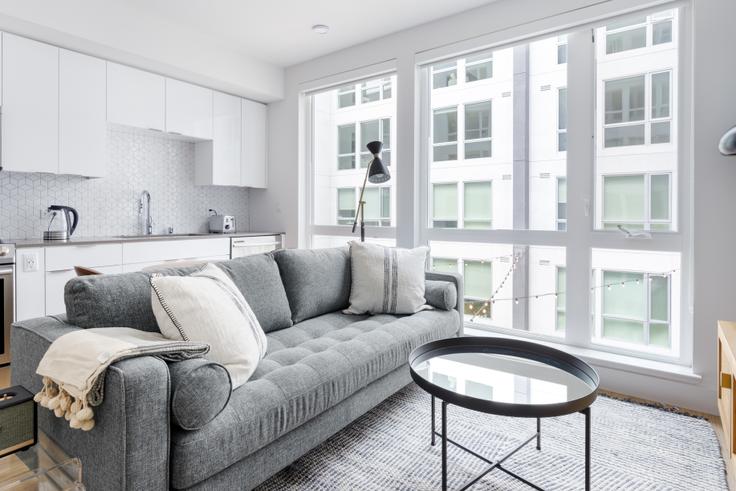Short-term rentals are usually apartments for families, be it condos or houses rented for a very short time. The accommodation could be rented for a night or even for a week. Compared to hotels, these rentals offer a personal touch, giving better options, like amenities, size, and accommodation.
Short-term rentals have been around for a few decades. At that time, it was known as “vacation rentals.” It had been a fashion to rent a vacation home in 1950 for people with families. Amsires.com helps short-term rentals in San Francisco to flourish. It has enabled travelers to visit San Francisco as per their flexible timing and rent accommodation available anywhere for a few days or even a month.
With a population of 815,000, San Francisco is part of the eight million-strong neighboring bay area. This city is just 47 square miles and is located in California in the United States. Here the median household income is $126,000 per capita, and most of its population is young, just between the ages of 25 to 44 years.
Ins And Outs Of Short-Term Rentals

The short-term rentals in San Francisco soared when online sharing platforms like Airbnb started a mobile app to book accommodations for travelers. Around seven out of 10 business travelers prefer to stay at short-term rentals than hotels.
One-bedroom average rent in San Francisco is around $2,995, whereas two-bedroom apartment rent is $4,025. The median sales price for homes is $1.2 million. This city has the highest percentage of homes costing more than one million dollars than anywhere in the United States. All relevant details about short-term rentals in San Francisco will become apparent by becoming aware of regulations concerning short-term rentals. These guidelines are,
Check The Eligibility

As per Charter 41 of the City’s Administrative Code, to host a short-term rental in San Francisco, the following conditions have to be fulfilled
Conditions For Host
A few conditions the host should qualify for before applying for short-term rental are
Permanent Resident
The host should have stayed in San Francisco for more than a year to become a permanent resident.
Owner Or Tenant
Should be an owner of the rental unit and have proper documents to prove that. If the host is a tenant, they should have written permission from the landlord stating approval to sublet.
If the tenant gives the apartment for short-term rental without approval from the landlord, then they are subject to eviction with a fine of up to $1000/- per day for the total period of unlawful rental.
Lived In Apartment
The host should have been residing in the same apartment for 60 days before applying for short-term rental.
Planning To Rent Out
The hosts can rent out the apartment for only 275 nights a year and not a single day more as per the regulations.
Accommodation Conditions

- Should follow all the city codes as per the regulations.
- Accommodations in The Presidio, Treasure Island, or Fort Mason are not eligible for short-term rentals.
- Accommodation should not be a Single-Room-Occupancy (SRO) and should never be a dormitory.
- The rent of the accommodation should not be below the current market rate (BMR), nor should it be below the public housing unit.
- The apartment should be designed and permitted only for residential use. Industrial or commercial buildings are not allowed for short-term rentals.
- The tenants will not be subjected to Ellis Act eviction after November 2014.
- Should never have sleeping areas outdoors, nor are sleeping quarters in vehicles or even tree houses allowed.
The host should comply with all the above conditions to get the accommodation approved for short-term rental.
Tips & Guidelines For Short-Term Rentals

The host should have fulfilled all the rules and regulations of short-term rental, including,
- When planning for hosted rental, wherein the host will be at the accommodation at the same time as the tenants staying in the same residential unit, there is no limit to hosted rentals per year.
- During the rental period, wherein the host is not at home as the tenants, these unhosted rentals are limited to 90 nights in a calendar year.
- Only the building in which the host resides should be registered for short-term rentals.
- The host should have property liability insurance of $500,000 so that the insurance will cover any damages incurred during the tenant’s stay.
Register As business
- Income earned from short-term rentals is considered a business by law. Therefore it is mandatory to register this business and obtain a Business Registration Number. This number is also known as Business Account Number (BAN).
- This hosting business has to be registered with the Treasurer & Tax Collector’s Office first. Then only the host should register this business with the short-term rental office.
- Now the host is ready to apply for a short-term accommodation rental. The application fee is non-refundable; it is valid for two years if approved.
Remain Compliant After Getting A Certificate

Once after getting the certificate to host, the owner should follow a few guidelines to remain compliant. These guidelines are,
Report Short-Term Rental Stays
The short-term rental stays must be reported quarterly to the office of short-term rentals within one month of the reporting period. The three-month reporting period is from January to March, April to June, July to September, and October to December.
Renew Business Certificate
The business registration certificate should be renewed annually with the Treasurer & Tax Collector. Every year by May 31st, renewals are due.
Pay Transient Occupancy Tax
Any host who collects rent from tenants for a stay less than 30 days must take 14% tax from the guests. It is called “Transient Occupancy Tax (TOT).” All taxes collected have to be paid to respective government departments.
Pay Business Personal Property Tax
The host should report all the business personal property to the Assessor-Recorder’s office and pay property tax annually. Taxable property includes property used by guests for rental, be it appliances in the kitchen, furniture, or other equipment.
Conclusion

Before Airbnb entered the market, Vacation Rentals by Owners (VRBO) was the first online rental platform in 1995. In 2006, Airbnb allowed guests to book a single room in a host’s home and pay online through a credit card.
In many cases, the average income generated by the hosts from short-term rentals is almost twice that of long-term rentals. It is because the rents of short-term rentals are nightly rates the same as hotels. Apart from that, depending on the demand, the host can change the price daily. The host should make sure to renew the certificate of hosting after every two years.

